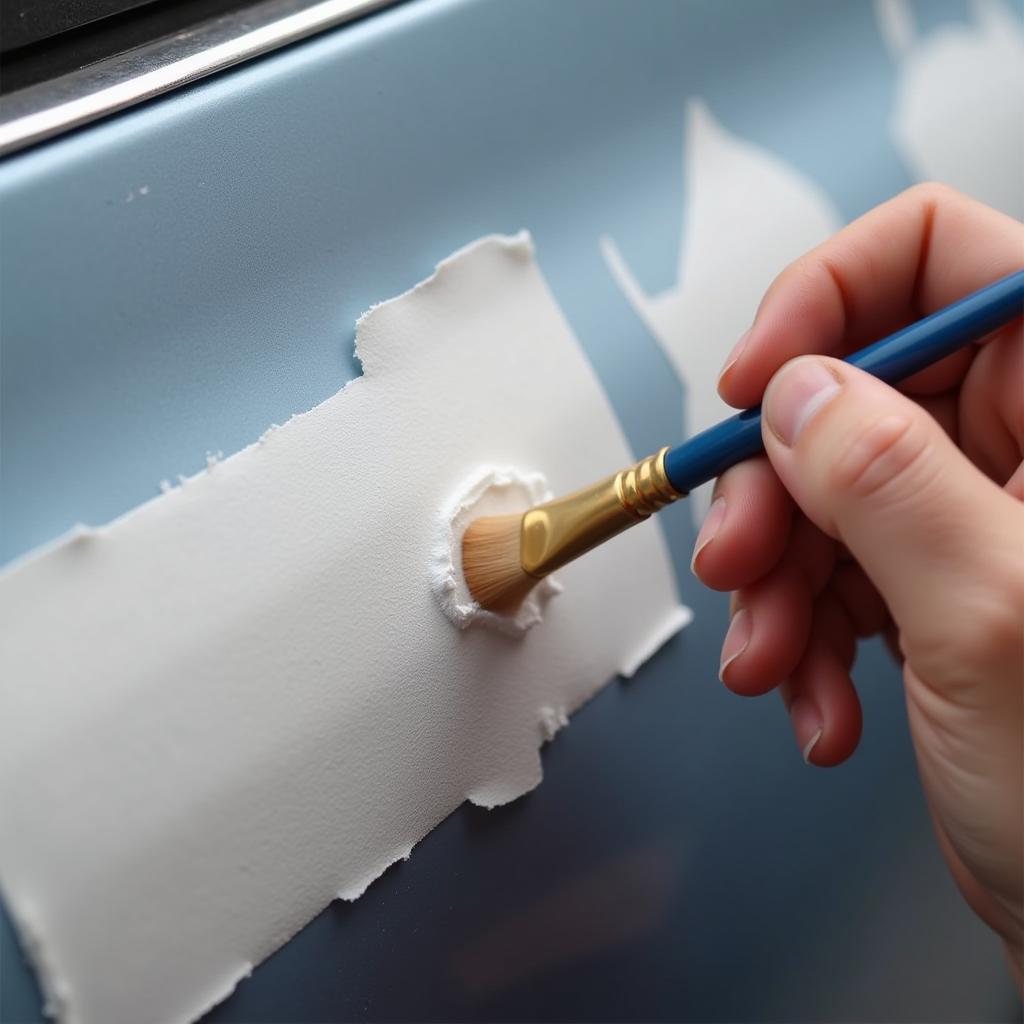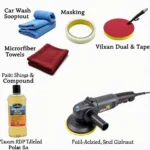Car rust and paint repair are essential for maintaining your vehicle’s appearance and structural integrity. Rust, if left untreated, can significantly compromise the strength of your car’s body, leading to costly repairs down the line. Similarly, damaged paint not only detracts from your car’s aesthetics but also exposes the underlying metal to the elements, increasing the risk of rust formation. This comprehensive guide will delve into the causes, prevention, and repair of both car rust and paint damage.
Preventing rust and paint damage is always more cost-effective than addressing the issues after they occur. Regular washing and waxing can protect your car’s paint and prevent rust. Additionally, addressing minor scratches and chips promptly can prevent them from developing into larger, more expensive problems. For more details on preventative measures, visit our guide on car paint and rust repair.
Understanding Car Rust
Rust is the result of oxidation, a chemical reaction that occurs when iron is exposed to oxygen and moisture. This reaction creates iron oxide, commonly known as rust, which weakens the metal and causes it to flake and deteriorate. Several factors can accelerate the rusting process, including exposure to road salt, acid rain, and coastal environments.
Types of Car Rust
There are several types of rust, each requiring a slightly different approach to repair. Surface rust affects only the top layer of paint and metal. Scale rust is more advanced, forming flaky scales on the metal surface. Penetrating rust is the most severe, affecting the metal’s structural integrity.
Tackling Car Paint Damage
Paint damage can range from minor scratches and chips to more extensive damage caused by collisions or environmental factors. Addressing these issues is crucial not only for aesthetic reasons but also for protecting the underlying metal from rust.
Common Causes of Car Paint Damage
Common causes of paint damage include stone chips, minor scrapes, UV damage from sunlight, bird droppings, and tree sap. Understanding the cause of the damage can help you choose the right repair method.
DIY vs. Professional Car Rust and Paint Repair
Minor rust and paint damage can sometimes be addressed with DIY methods, using readily available products like touch-up paint and rust converters. However, more extensive damage often requires the expertise of a professional. They have the necessary tools and experience to properly remove rust, repair the metal, and apply a new paint coat for a seamless finish. Looking for professional car repair services in Denver? Check out our resource on car paint and rust repair denver.
Preventing Rust and Paint Damage
Protecting your car from rust and paint damage involves regular maintenance and a few preventative measures. Washing and waxing your car regularly removes dirt and grime that can scratch the paint and trap moisture, promoting rust. Applying a sealant can further protect the paint and provide a barrier against the elements.
Protecting Your Investment
Taking preventative measures to protect your car’s paint and prevent rust can save you significant money on repairs in the long run. Consider these as investments in maintaining your vehicle’s value and longevity.
How Much Does Car Rust and Paint Repair Cost?
The cost of car rust and paint repair varies depending on the extent of the damage, the type of repair needed, and the location. Minor repairs, such as touching up small scratches, can be relatively inexpensive. However, more extensive repairs involving rust removal, bodywork, and repainting can be significantly more costly. Need to know what materials you’ll need? Check out matreial needed repair rust paint damage to car. For more information regarding car body rust repair and paint, you can refer to car body rust repair and paint.
Factors Affecting Repair Costs
Several factors influence the overall cost, including the size and location of the damage, the type of paint used, and labor costs. Getting multiple quotes from reputable repair shops can help you find the best price.
What are the signs of rust on my car?
Look for bubbling paint, reddish-brown discoloration, and flaking metal.
Can I repair rust myself?
Minor surface rust can be addressed with DIY methods, but deeper rust often requires professional attention.
How can I prevent car paint from fading?
Regular waxing, parking in the shade, and using a car cover can help protect your car’s paint from fading.
What is the best way to remove rust from my car?
Sandblasting, wire brushing, and chemical rust removers are common methods for removing rust.
What type of paint should I use for car touch-ups?
Use touch-up paint specifically designed for your car’s make, model, and color. If you are unsure about DIY repairs, check out this helpful resource: paint and rust repair on car.
How often should I wax my car?
Waxing your car every three to six months is generally recommended.
How long does car paint repair take?
The repair time depends on the extent of the damage, ranging from a few hours for minor touch-ups to several days for more extensive repairs.
In conclusion, car rust and paint repair are crucial for preserving your vehicle’s appearance and structural integrity. By understanding the causes of these issues and taking proactive steps to prevent them, you can keep your car looking its best and avoid costly repairs down the road. Regular maintenance, prompt attention to minor damage, and seeking professional help when needed are key to maintaining your car’s value and longevity.
For any car repair inquiries or assistance, contact us via WhatsApp: +1(641)206-8880, Email: [email protected]. Our 24/7 customer support team is always ready to help.


